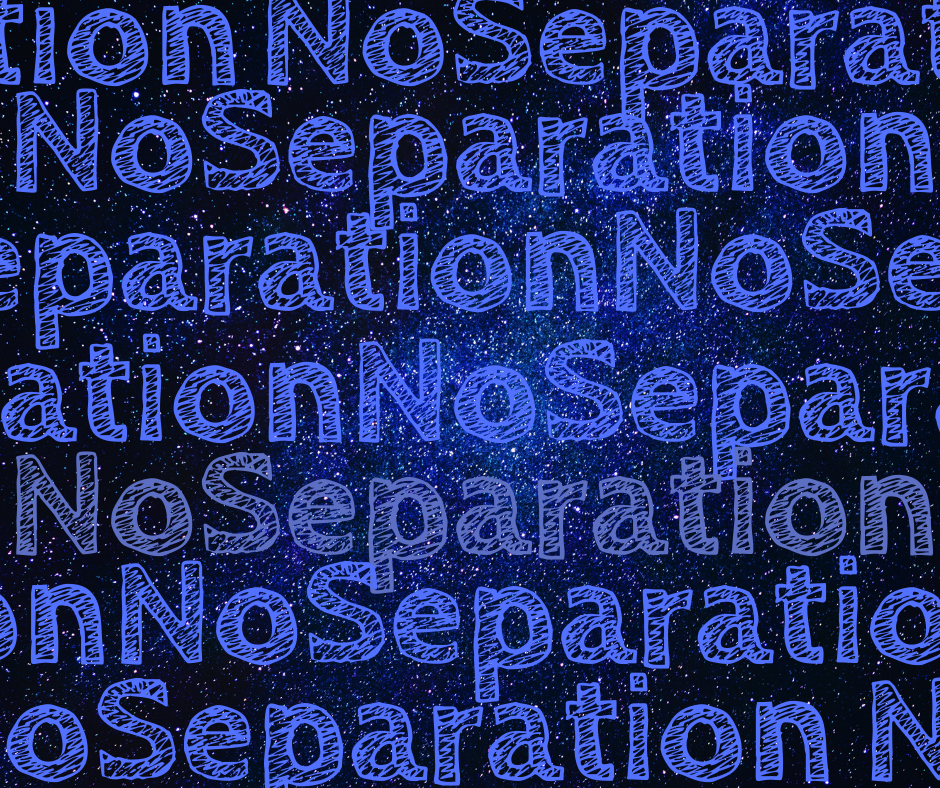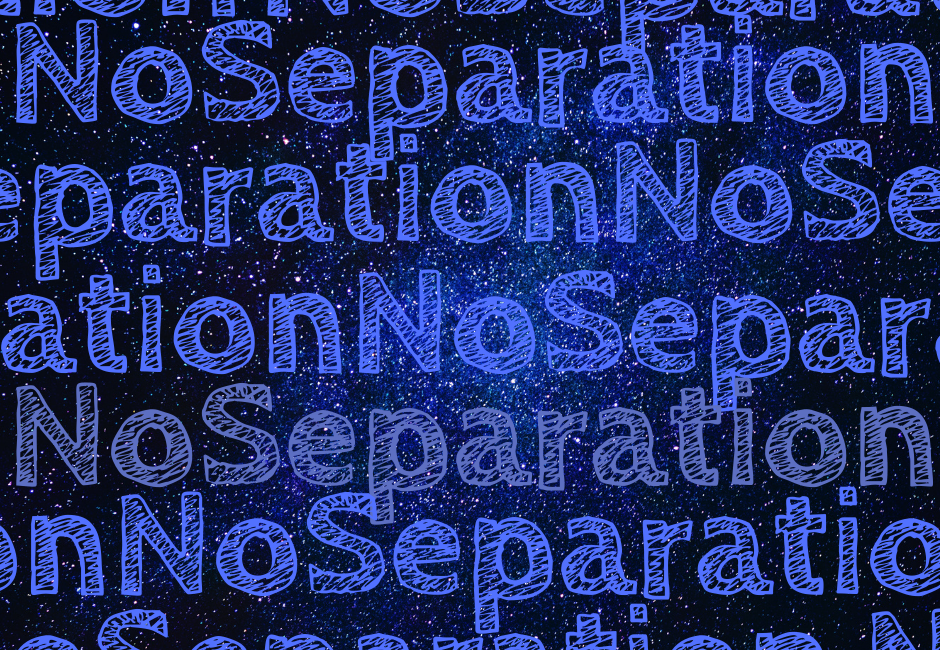Unitarian Universalist Church of Birmingham
April 10, 2022
Reverend Karen G. Johnston, Guest Minister
If I can’t save us
then let me feel you
happy and safe
under my chin.
If this will drown
or burn
then let us drink starlight
nap under trees
sing on beaches—
the morning rush to sit indoors
what, again?
If we are dying
then let me rip open
and bleed Love,
spill it, spend it
see how much
there is
the reward for misers is
what, again?
If this life is ending
then let me begin
a new one
In seminary I took a whole semester’s class solely dedicated to the Book of Revelation, a special hell all of its own. This is one of the many ways you can discern that I did not go to one of the two Unitarian Universalist seminaries.
The Book of Revelation is the last book in the Christian Scriptures, responsible for so many of our cultural reference points for the Apocalypse, like the four horsemen. It is not, I must inform you, not responsible for the Rapture, no matter what the rapturists say — it’s not actually in there.
It’s possible that I read too many dystopian novels. My friends know me to have strong opinions about the recent film adaptation of my favorite novel, Station Eleven. I do not have a bunker filled with two years’ worth of food though my garage does hold a three-month supply (which, it turns out, is what the Church of the Latter-Day Saints encourages its members to have).
It is true that I am more than curious about what it will take to survive, if not the Apocalypse, then the approaching collapse that many suggest is in the foreseeable future – whether due to the climate crisis, or to the steady slide toward authoritarianism not only in this nation but throughout the world, or the convergence of both.
And I am deeply committed to cultivating personal and community capacities to survive not at any cost, for I find that a repugnant goal, but to build, as Margaret Wheatley calls them, “islands of sanity[i]” ~ compassionate, resilient islands of sanity ~ that just might see some of us through to what is beyond the Apocalypse.
~~~
When you think about collapse or about what an imminent apocalypse might look like, what comes to mind?
Is it the spread of a novel virus that fells an unfathomable number of humans?
Is it the relentless melting of our polar ice caps that leads scientists to propose building a 300-mile dam between Scotland and Norway?
The mass extinctions of so, so many species of both flora and fauna?
Is it the coming down of the electrical grid that leaves those of us who have become so dependent on our technology adrift in a sea of relative isolation and irrelevant skills? Or blocks access to life-sustaining medicines or treatments that are dependent upon refrigeration?
Is it deep corruption of civic institutions, a justice system doubling down on its foundations of systemic racism, rising misogyny-fueled acts of violence, and the spreading white Christian ethno-nationalism, as Michael Hogue posits[ii]?
What if, as this morning’s reading from Chelsea MacMillan point to, this death knell collapse, this possible apocalypse, is the lifting of the veil on a world that for far too long has been saturated in separation and greed[iii]? A painful lifting of the veil, a chaotic one, to be sure. One which is real, not metaphorical, not poetic. Yes, in which suffering is exacerbated, but which may be necessary before our collective compass might return to the deep, saving truth of our interconnectedness, from which we have strayed so damn far.
For that is the original meaning of apocalypse – not the end of the world, and definitely not judgement day, but, if we go back to the original Greek, an unveiling or an uncovering. Which is another way to say a revealing – a revelation, and hence the title of that book from Christian Scriptures, which barely made it into the Christian canon.
You see, back when that was written, there were many, many apocalyptic writings. Learned people naming corruption, speaking out against false gods, calling us to return to living within the limits of natural laws, calling us to return to living in balance with our home, this Earth.
I don’t know about you, but I am seeing a lot of this type of thing. Just think about the recent splash of the movie, Don’t Look Up, with its storyline of an asteroid on track to hit the earth, yet so many people continue to occupy themselves with fake news and materialistic consumption.
What if we are facing an ecological apocalypse, not because we are facing so many forms of extinction (though we are), but because there is an apocalyptic invitation to uncover falsities and to return to right relationship with Nature, with the planet, with other sentient beings, with each other.
What if our task now, in this moment not so much of pre-apocalypse, but of mid-apocalypse (ask the residents of Isle de Jean Charles, in Louisiana, who have had to be relocated en masse, as a whole community, because their home of centuries is now drowning in salt and sinking into the sea, unlivable), is to
practice resilience, rather than to prep for survival
Practicing now because if we wait for additional, more frequent catastrophes to begin, it will be too late.
What is resilience? Certainly, it’s more than avoiding headaches from caffeine deprivation. Though that’s a strategy worthy of consideration, especially for a people – I’m looking at you, Unitarian Universalists – who claim coffee as our holy water.
How about this definition, which comes from The Emotional Resilience Toolkit for Climate Work?:
Emotional resiliency includes increasing our capacity to bear witness to the difficulties we are facing.
Colloquially, we often say that resilience is the ability to “bounce back.” But what if there is no back to bounce to? Instead, consider resilience as the capacity to integrate disturbance and reorganize, perhaps repeatedly, in order to be able to function, build structures for living, and maintain a sense of identity.[iv] We have someone named David Fleming to thank for that definition.
We must also be aware that resilience is emergent, meaning that we can’t know ahead of time what makes up resilience because it emerges as part of the process of practicing it.
Three things:
- Bearing witness.
- Integrating disturbance in order to be able to function, build communal living, and maintain identity.
- Emergence.
~~~
Most zombie apocalypse movies, books and video games are predicated on survival based on an over-abundance of shooting guns. However, and I say this as someone who grew up in rural Oregon, I believe that more important than knowing how to shoot a gun is knowing when to shoot one. And when not to.
Perhaps even more important is knowing how to de-escalate conflict among a group of people who are traumatized, freaked-out, and reactive: a key capacity when it comes to resilience.
Resilience is our capacity to return to the table – again, and again, and again — when we experience conflict. Which is also necessary for a healthy congregational life.
Resilience is our capacity to manage discomfort and strong emotions, so that our behavior can be more intentional than impulsive.
Resilience is growing our capacity to connect across difference, especially with people not gathered together because of like-minded-ness, but because of close proximity. And in such circumstances, using our Unitarian Universalist super power of radical inclusion to guard against the human tendency, in the midst of resource scarcity, to exclude and harm.
Chris Begley is a professor of anthropology in Lexington, Kentucky; he is also a wilderness survival instructor. In 2019, he wrote op-ed piece in which he wrote:
We will not be by ourselves, with only the people we choose, avoiding those we do not understand or trust. We will not be free from the need to cooperate and compromise.
Begley goes on to say
While the wilderness survival skills certainly can’t hurt, it will be empathy, generosity, and courage that we need to survive. Kindness and fairness will be more valuable than any survival skill. Then as now, social and leadership skills will be valued. We will have to work together. We will have to grow food, educate ourselves, and give people a reason to persevere. The needs will be enormous, and we cannot run away from that. Humans evolved attributes such as generosity, altruism, and cooperation because we need them to survive. Armed with those skills, we will turn towards the problem, not away from it. We will face the need, and we will have to solve it together. That is the only option.
That is what survival looks like.

Let us reclaim apocalypse, admitting to ourselves, each other, and the wider world that it – the Great Unveiling — is happening now.
Let us strip away the lies of self-sufficiency and despair, finding our way back to the truth of our interconnectedness.
Let us cultivate the kind of resilience that looks like courage, that looks like caring, that looks like connection, that looks like compassion, that looks like covenant, all of which we are going to need when the world looks a lot different than it does now.
As the poem at the beginning of the sermon entones: If we are dying, then let [us] rip open
and bleed Love, spill it, spend it see how much there is…
So be it. See to it. Amen.
[i] Wheatley, Margaret. Who Do We Choose To Be, Berrett-Koehler Publishers, 2017.
[ii] https://divinity.uchicago.edu/sightings/articles/vulnerability-and-resilience-democracy
[iii] https://medium.com/@revchelseamac/its-time-to-reclaim-the-apocalypse-c2ee43001005; this link no longer works, but a similar article can be found here: https://reimaginingmagazine.com/project/reclaim-the-apocalypse/?fbclid=IwAR1Yh94xvjlH1S9Vyv9HyPuZ8aZ0Z3KSIoiXnVL59RGAyliZwta_QaT8vD8
[iv] Adapted from a reference to David Fleming’s work in this article: https://www.kosmosjournal.org/kj_article/resilience-the-global-challenge-and-the-human-predicament/
